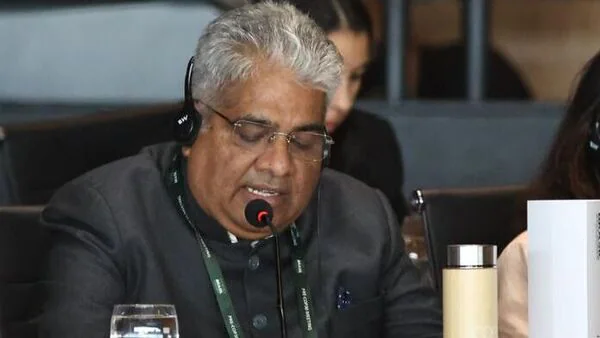
India Backs Ecosystem-Based Approach To Tackle Climate Change
“India truly believes and supports ecosystem-based approaches, participatory implementation, and landscape-level conservation models as proposed in the biodiversity and conservation rack,” said Bhupender Yadav, Union minister for environment, forest and climate change, while delivering India's national statement. The minister cautioned against the commodification of biodiversity, calling for deeper global deliberations on the issue.
Congratulating the South African presidency for identifying six thematic priorities that address global environmental challenges, ranging from biodiversity conservation to ocean health, Yadav said that India looks forward to building on the substantive work done by the South African Presidency and working closely with the incoming presidency.
Global recognition welcomedOn the themes of land degradation, desertification, drought, and water sustainability, India welcomed the global recognition of land restoration as both an ecological and economic opportunity. Yadav called for co-developed, non-restrictive technology transfer and proposed the establishment of a 'G20 Knowledge and Solution Exchange Platform' to foster the sharing of best practices. He stressed the need for voluntary and flexible global standards with a strong focus on women, youth, and smallholder farmers.
Also Read | Paris Agreement: 'Disorderly energy transition is derailing climate goals' Also Read | India invests in modern seed labs to battle climate, boost yields Also Read | Green bonds stumble as investors refuse to pay a premiumAddressing chemicals and waste management, the minister appreciated the G20's emphasis on circular economy principles and shared India's experience with extended producer responsibility (EPR) frameworks as scalable models. He underlined that global frameworks for chemical management should remain voluntary and nationally determined, warning against the imposition of trade-linked or prescriptive technology standards that could burden SMEs and developing economies.
Support for integrating actionOn climate change and just transitions, Yadav reiterated India's support for integrating climate action with development priorities, guided by equity and the principle of common but differentiated responsibilities and respective capabilities (CBDR-RC). He emphasized the need for finance, technology, and capacity-building support to ensure a fair transition across all sectors.
With respect to air quality, India endorsed cooperative capacity-building but cautioned against uniform approaches that do not account for national contexts.
Yadav supported marine spatial planning as a means to promote sustainable development and biodiversity protection. He backed voluntary global efforts to address the issue of abandoned, lost and discarded fishing gear (ALDFG), while safeguarding the livelihoods of small-scale fishers. He strongly urged that efforts to decarbonise marine transport must be grounded in equity and climate justice, with clearly defined means of implementation for developing countries.
Legal Disclaimer:
MENAFN provides the
information “as is” without warranty of any kind. We do not accept
any responsibility or liability for the accuracy, content, images,
videos, licenses, completeness, legality, or reliability of the information
contained in this article. If you have any complaints or copyright
issues related to this article, kindly contact the provider above.
Most popular stories
Market Research

- Cregis At FOREX Expo 2025: Connecting Forex With Crypto Payment
- Seascape Launches First Tokenized BNB Treasury Strategy On Binance Smart Chain
- FLOKI Funds Clean Water Wells In Africa Through Partnership With WWFA
- Pepeto Highlights $6.8M Presale Amid Ethereum's Price Moves And Opportunities
- BTCC Exchange Hits 10M Users And $1.15T Q3 Trading Volume, Accelerating Global Expansion
- Mutuum Finance (MUTM) New Crypto Coin Eyes Next Price Increase As Phase 6 Reaches 50% Sold




















Comments
No comment